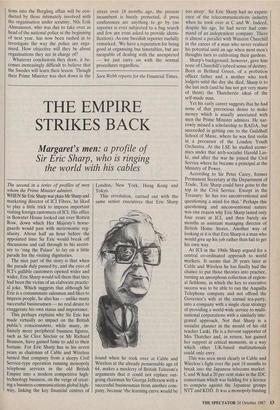THE SPY WHO LOVED AND LEFT
Sara Webb reports on the
disappearance of the enemy agent Sweden let go
Stockholm HARDLY a day goes by in Sweden without the establishment of some investi- gating body or commission: in the last year or so there have been investigations into the arms smuggling activities of the coun- try's leading weapons producer, investiga- tions into why the Prime Minister, Olof Palme's assassin still has not been cap- tured, and investigations into the conduct of various ministers and officials.
Sweden has investigations the way Man- ila has coup rumours. The latest matter claiming the attention of the civil servants is how the top spy, Stig Bergling, held in the country, managed to escape while on conjugal leave on 5 October and why it was that several hours elapsed before a nation- al alert went out.
In a country where the tendency — 'A tree fell on the BMW and a broker fell on the Porsche.' outside the private sector at least — is to shun responsibility, the authorities ulti- mately responsible for Bergling (the prison board, police and the justice minister, Sten Wickbom) were initially quick off the mark to declare their innocence. The justice chancellor, who plays the role of govern- ment ombudsman, put the blame on the prison board, and in particular its division- al head, Clas Arnilon. After two weeks of public outcry, Sten Wickbom decided to resign. The delay was embarrassing as there had been calls from politicians, in- cluding Social Democratic Party members, for his departure.
It transpired that the prison knew that security for Bergling had been inadequate on a previous conjugal visit — nevertheless he was allowed a third (and last) leave, and, though this information was passed to the justice ministry on 24 September, Wickbom says he did not hear of it until 16 October — after the bird had flown.
For once, in Sweden, a government minister had actually had to take responsi- bility for shortcomings within his depart- ment. It will be interesting to see if this practice holds in future — already several others in the justice ministry as well as the head of the prison board have resigned.
Stig Bergling was sentenced to life im- prisonment in 1979 for passing secrets to the Soviet Union. He had worked for the Swedish security police (known as Sapo) and for the defence staff, and though he had proved extremely unco-operative dur- ing his trial, it was believed that he passed information to Soviet intelligence about which of their agents Sapo had its eyes on — including a Soviet dipolmat who was about to defect but who was recalled to Moscow before he could do so.
Bergling caused even more damage be- cause of the information he had about Sweden's coastal defences. He is thought to have provided the Russians with de- tailed information about the rock cham- bers and mine loops which guard the main naval bases. Many of these mine loops are activated from control stations on shore. So far, the Swedes have spent over SKr 300 millon (about £30 million) in an attempt to undo the damage by rebuilding these de- fences, though it has not prevented Soviet submarines from paying occasional visits to their waters.
As the defence staff never knew exactly how much information Bergling passed on (for money, it seems, rather than for ideological reasons), it still regards Berg- ling as a high security-risk. Surprisingly, he was not treated as such.
Life imprisonment in Sweden usually means ten to 12 years. Bergling had his application for early release turned down and had suffered from drink problems and depression. While in prison, he heard from Elisabeth Sjogren, a woman who said she was a childhood friend and whom he married in March 1986.
It may well be that Elisabeth was a Russian contact set up to help him escape. Little is known about her, though it seems she spoke Russian and did some part-time welfare work. In a country where one salary is simply insufficient to support two people, it is a mystery how she supported herself — unless somebody else was paying the bills.
Bergling in the meantime applied to change his name and become Eugen Sand- berg. He shaved off his moustache, changed his hair colour from dark brown to mousy, and exercised regularly in order to shed three and a half stone. Most prisoners are hard pressed to keep slim in Swedish jails — but Bergling was determined to lose weight and his face is now consider- ably thinner.
We are so damned progressive in this country, we even give our spies a new identity so that they can be rehabilitated' said one foreign ministry official. Bergling/ Sandberg was also allowed to keep his old passport though just what travelling he was expected to do is not clear. On top of all this, he was allowed conjugal visits, and on the two previous occasions had conducted himself so well that his disappearance on the third visit came as a complete surprise and great disappointment to the prison authorities, who evidently thought they had a reformed character on their hands.
Mr and Mrs Bergling/Sandberg were treated by the prison officer to dinner at one of Stockholm's most exclusive res- taurants (clearly a hamburger joint is not good enough for the country's top spy) on the evening of Monday 5 October. The prison officer then took them to Eli- sabeth's flat in a Stockholm suburb and, assuming that the Sapo officers would take over his watch, left at 10 p.m. But there was no one on watch, and not surprisingly, when the prison officer returned at midday on Tuesday to take Bergling back to his prison cell in Norrkoping, the flat was empty. He alerted the prison authorities, the police and Sapo, but no alarm went out until ten hours later — and 24 hours after the couple had waved goodbye to their minder.
Some of the customs authorities did not hear until the following morning and photographs of Elisabeth did not appear until Thursday — it later transpired that they were out of date, for she too has altered her appearance. Swedish television pointed out to its less imaginative viewers that Mrs Sandberg might not be wearing her spectacles — which of course would make her appear slightly different too.
So far, the police have found a getaway car near Helsinki and a witness claims to have seen the couple on the boat to Russia. The policd remained optimistic that the couple could still be found in Sweden (where another of their hired cars was found) even ten days after their escape. Apart from the rumoured Swiss bank account, the couple had saved money for the escape. Elisabeth asked for a bank loan earlier this summer and Stig was still entitled to his pension of about £400 a month.
It is quite clear that the couple planned their escape with remarkable patience and care. Foreigners who are jailed in Sweden often complain that they do not obtain permission for conjugal leave because the authorities are frightened they will use the opportunity to race for the nearest ferry out of Sweden. That this possibility did not occur to them in the case of Stig Bergling is extraordinary, and the authorities now admit it was a mistake.
Mr Wickbom's successor,.. Anna-Greta Leijon (formerly the labour minister), has been brought in to see that there are not further mishaps in the ministry now that two justice ministers in a row have had to resign (Wickbom's predecessor, Ove Rain- er, was criticised for his skilful tax- planning), and given that the government faces a general election next year it cannot afford any more embarrassing incidents.
Moreover, Wickbom had become a bit of a political handicap. He had already been strongly criticised for the way in which the Palme murder inquiry was con- ducted, but had steadfastly refused to resign on that occasion. Mrs Leijon at least has a tough no-nonsense approach (no doubt fostered by dealing with unions).
For the Swedes who are appalled to see such incompetence at senior level, it is not much comfort to know that the investiga- tions into the Bergling affair will be con- ducted by those intimately involved with the organisation under scrutiny. Nils Erik Ahmansson, who was due to take over as head of the national police at the beginning of next year, has now been rushed in to investigate the way the police are orga- nised. How objective will they be about organisations they are in charge of?
Whatever conclusions they draw, it be- comes increasingly difficult to believe that the Swedes will learn their lesson. Though their Prime Minister was shot down in the street over 18 months ago, the present incumbent is barely protected, if press conferences are anything to go by (no reporter is ever subjected to a bag search and few are even asked to provide identi- fication). As one Swedish reporter ruefully remarked, 'We have a reputation for being good at organising bus timetables, but are incapable of dealing with the unexpected — we just carry on with the normal procedures regardless.'
Sara Webb reports for the Financial Times.




















































 Previous page
Previous page